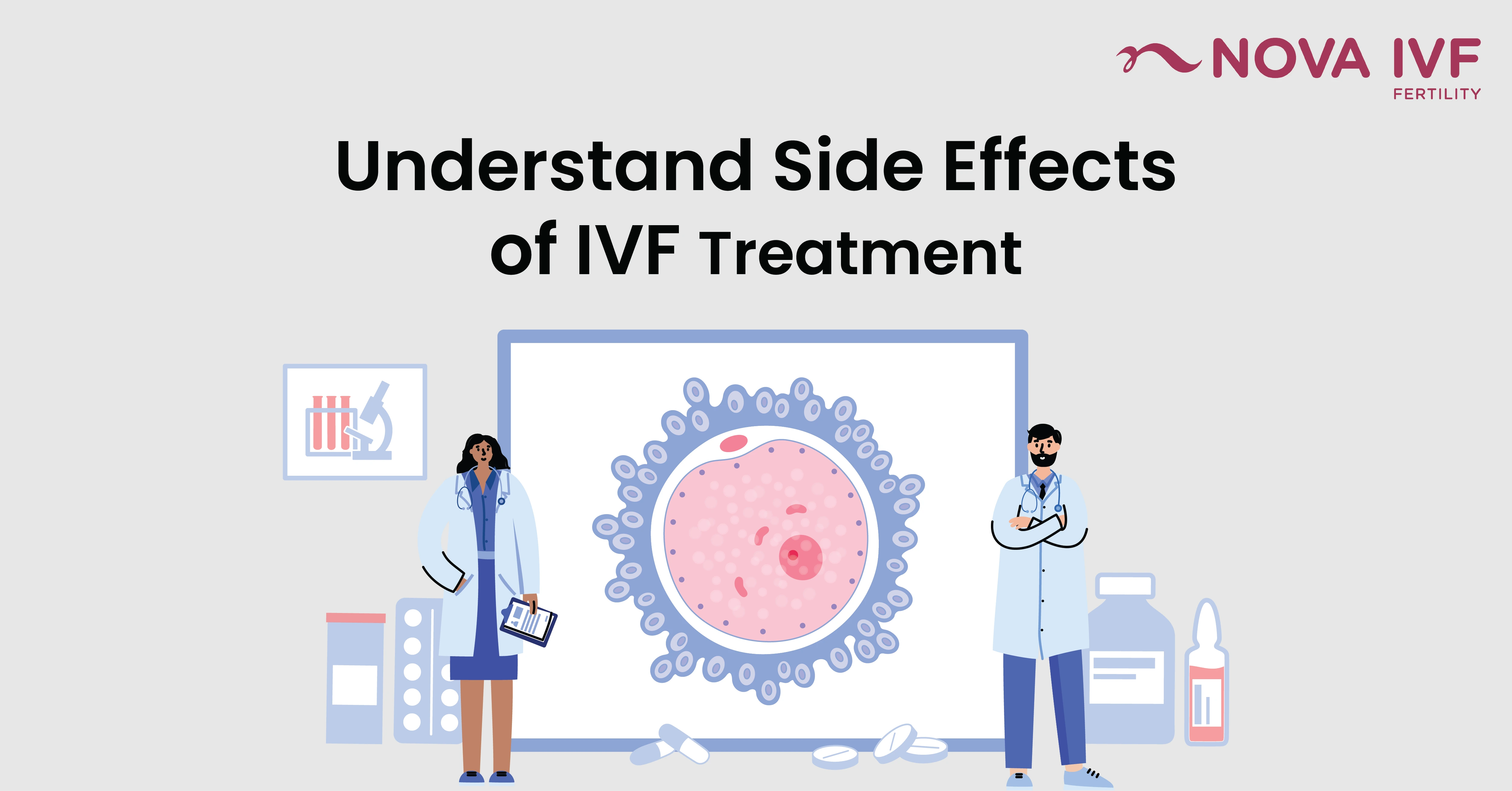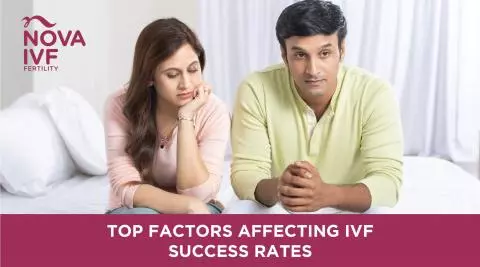Understand Side Effects of IVF Treatment

The complex and expensive procedure of IVF is sought out by many couple who are experiencing infertility. As with any other medical procedure, IVF has its own set of complications. Although many women who go through IVF treatment process don’t experience any major side effects, it is worth learning about them. The benefits of IVF treatment far outweigh the risks associated with it. Thus, many people continue to trust fertile specialists to fulfil their dreams and start a family.
However, learning about these can help you make an informed decision and prepare yourself for the life-changing journey of becoming a parent through IVF. Besides being aware of the possible side effects of IVF can help you get medical attention at the right time. This article sheds light on the side effects of IVF associated with each step of the process.
Understanding the IVF Journey and Its Benefits
In vitro fertilisation (IVF) has become very popular to help couples dealing with infertility and women who wish to delay childbearing to either pursue their dreams or want to prepare for a brighter future for their little one. Unlike other assisted reproductive technologies (ARTs) like intrauterine insemination, IVF is quite complex. The procedure involves extracting the woman’s eggs from her ovaries, fertilising them in an embryology lab, and transferring a viable embryo back into the woman’s womb.
The following group of women stand to benefit from going through IVF treatment to conceive their child:
- Women who have absent fallopian tubes or whose fallopian tubes can be repaired without surgery
- Women who have endometriosis
- Women who experience ovulatory dysfunction
- Women who have a T-shaped uterus
- Couples who are experiencing unexplained infertility
- Couples with a very low sperm count of the male
There are numerous benefits of IVF treatment, some of them are mentioned below, as this ART offers hope to couples and individuals who are experiencing infertility or those who wish to preserve their fertility:
- Increased chances of conception
- Flexibility in building your family according to your own terms
- Advanced screening tests offer an increased chance of giving birth to a healthy baby
- Option to choose the pregnancy timeline
What can I expect from IVF treatment?
People who are experiencing difficulty in conceiving generally contact their gynaecologist or a fertility specialist after 1 year of failed attempts. After doing a thorough examination of you and your partner, the doctor will recommend a treatment plan.
After all the preparations are made, one cycle of IVF treatment can take about 2-3 weeks in total. You may require more than 1 cycle of IVF to get pregnant as the average rate of success for an IVF cycle is 37.6% for women aged under 35. The success rates of IVF drop significantly with the advancing age of the female. IVF procedure side effects is also observe which is not risky but has minimal inconvenience. There are millions of women who have undergone IVF treatment across the globe. The success is generally over 85% over 4 cycles which is advised. This depends on the age, comorbid conditions, age and quality of egg and sperm etc.
The Stages of In Vitro Fertilization (IVF) and its Side Effects
Here is a step-by-step explanation of the different stages of IVF for women:
Step 1: Suppression of the woman’s Natural Menstrual Cycle
Once you decide to go forward with IVF infertility treatment, your doctor is likely to start you on medication to suppress your natural menstrual cycle. This medication also improves the efficiency of the treatment in further stages of IVF.
Medicines to suppress menstrual cycle is usually administered through a daily infection or a nasal spray and continue on for about 2 weeks. Many women are taught to give the injections to yourself.
Step 2: Stimulation of Ovaries to Produce More Eggs
You start taking a fertility hormone called follicle stimulating hormone (FSH) once your natural menstrual cycle is suppressed. This increases the number of mature eggs produced by your ovaries, leading to a successful extraction process of as many healthy eggs as possible in one IVF cycle. The number of eggs retrieved in an IVF cycle is one the key factors that influence the success rates of IVF treatment.
The fertility clinic you partner with will keep an eye on you throughout the whole journey and may call you in for regular tests; vaginal ultrasounds, blood tests, etc. are used to monitor your progress. According to the timeline, your fertility specialist will give you a human chorionic gonadotrophin (hCG) injection to help your eggs mature properly and within time for retrieval.
Associated risks include the following:
- Hot flushes
- Headaches
- Restlessness
- Feeling irritable
- Nausea
- Soreness and mild bruising at the injection site
- Tender breasts
- Ovarian hyperstimulation syndrome
Step 3: Egg Retrieval
During the egg retrieval phase of the process, you will be sedated, and the doctor will collect mature eggs using a needle. This needle is passed through your vagina and into the ovaries under the guidance of ultrasound. This minor procedure takes about 15-20 minutes to complete.
After mature eggs are collected, you will be given medication to prepare the body for receiving the fertilised embryo. These medicines are usually administered as an injection, a gel, or a pessary placed inside the vagina to prepare the lining of your uterus.
Associated risks include the following:
Risks associated with this procedure include camping or vaginal bleeding in small amounts for a few days post egg retrieval; however, not all women experience these symptoms. Pelvic infection and injury to nearby organs are other rare complications of this step in IVF treatment.
Step 4: Egg Fertilisation
The eggs that were collected during egg retrieval process are fertilised in the lab using either your partner’s or the selected donor’s sperm. For couples who have male infertility, an advanced assisted reproductive technology (ART) intra-cytoplasmic sperm injection (ICSI) is recommended. In this procedure, a single sperm is carefully selected and injected into an egg individually to assist with fertilisation.
The fertilised eggs or embryos are then kept under safe conditions in the embryology lab for observation. They are kept under observation for up to 6 days before 1 or 2 embryos are selected for transfer into the womb.
Step 5: Embryo Transfer
Once the embryos are ready to be transferred to the womb, the doctor will call you in with an update on the number of fertilised eggs that survived the procedure. Usually, 1 embryo is transferred into the womb, but depending on certain factors, the doctors may transfer 2 embryos into the womb. The procedure of embryo transfer is simple; it involves the transfer of an embryo into the womb using catheter (a thin tube) passed through the vagina. Many people say that the embryo transfer procedure feels like having a cervical screening test.
If there are successfully fertilised embryos left from the current batch, your doctor will advise you to freeze them for future use in case the requirement ever arises.
The IVF treatment procedure for men is simple; around the time of egg retrieval of the female, the male is asked to produce a fresh sperm sample. These sperms are later washed and spun at high speed in order to segregate the most active and healthiest sperms for fertilisation. Similar preparation procedure is used for donor sperms.
Associated risks include the following:
You risk giving multiple births if more than 1 embryo is transferred into the womb during IVF treatment. IVF increases your chances of conceiving twins, triplets, or other multiplets. Additionally, women may experience mild cramping because of the catheter and in rare cases, they may develop an infection.
What IVF side effects or issues could I experience during IVF treatment?
IVF fertility treatment can increase the chance of certain health problems among others for the mother as well as the children. Some studies have found that children born through IVF may experience the long-term side effects of IVF after delivery, including increase in total body fat composition, raised blood pressure, elevated fasting glucose levels in the blood, and advancement of bone age.
The aforementioned risks for children born through IVF should be taken with a grain of salt as there isn’t enough data to make any concrete claims about the long-term side effect of IVF treatment. Such studies have several limitations, including low participation. Additionally, the general evidence
Common IVF treatment side effects for women who choose IVF treatment are mentioned below:
Stress
Stress is one of the most common IVF procedure side effects. IVF can be extremely draining for the mind and body in addition to being financially straining for many people. It is recommended that you seek support from your partner or a professional counsellor to navigate the IVF procedure.
Extreme mood swings
Rapid shifts in your mood, increased irritability, and enhanced emotional sensitivity are some of the common IVF medication side effects. The medicines given in IVF treatment cause significant hormonal changes that can greatly impact your mood regulation, which can cause you to experience moments of emotional highs and lows.
Side effects caused by egg retrieval
Although a minor outpatient procedure, the egg retrieval process carries a certain level of risk. For example, the needle used for egg retrieval can cause bleeding, damage to nearby organs (such as the bowel, blood vessels, or urinary bladder), or infection.
Ectopic pregnancy
Ectopic pregnancy is a condition in which a fertilised egg attaches to tissue outside the uterus and continues to grow for a certain period of time before causing problems. An ectopic pregnancy often occurs in the fallopian tube, but the embryo cannot survive anywhere but the uterus. Such pregnancies cannot be continued for obvious reasons and require medication in the early stages for treatment and surgery for later stages.
People who are going through an IVF treatment have a chance of experiencing an ectopic pregnancy.
Multiple pregnancy
Since IVF manipulates the production of mature embryos, it increases the risk of multiple pregnancies. In some cases, doctors intentionally transfer 2 embryos in the womb of the female to improve her chances of becoming pregnant. However, this is done as per regulations and only after carefully considering possible options and assessing the risks involved.
Becoming pregnant with more than 1 babies is associated with a higher risk of high blood pressure and gestational diabetes in addition to premature delivery, pre-eclampsia, anaemia, low birth weight of each infant, birth defects than a single pregnancy.
According to the National Institute for Health and Care Excellence (NICE), double embryo transplantation is recommended only for women who are aged 40 to 42. Double embryo in younger women should be considered only when there are no top-quality embryos to choose from.
Ovarian hyperstimulation syndrome (OHSS)
This is a health condition in which the ovaries become painful and swollen due to the medication used for stimulating ovaries to produce a high number of mature eggs. The symptoms of this rare complication of IVF are listed below:
- Pain and bloating in your lower abdomen
- Shortness of breath
- A general feeling of being ill
- Dizziness
You are advised to contact your fertility clinic as soon as you notice any of these symptoms as severe cases of OHSS can be life-threatening. OHSS usually affects women who are extremely sensitive to the fertility medicine taken to stimulate ovaries and increase egg production. In this case, too many eggs develop in the ovaries, leading to enlargement of ovaries accompanied by pain.
Low birth weight and premature delivery
According to research, premature delivery and/or lower-than-normal birth weight is one the IVF side effects of this ART.
The success rates of IVF treatment decline with advancing age. Additionally, older of are more likely to experience miscarriage and birth defects than younger women.
What are the side effects women may face after an IVF cycle?
Women experience side effects after an IVF cycle usually from either egg retrieval process or continued medication. You may experience the following as after-effects of the egg retrieval process:
- Mild cramps in the lower abdomen or pelvic region
- Bloating
- Clear or bloody vaginal discharge for some time
- Constipation
- Tender breasts
Continuation of hormonal medication can cause the following side effects:
- Bloating
- Mood swings
- Tender breasts
- Excessive fatigue
Conclusion
IVF is certainly an excellent medical treatment that can bring positive change into the lives of many couples. Although there are certain side effects associated with the treatment, the benefits of IVF far outweigh the risks. However, being aware of the steps involved and associated risk is important to help you make an informed decision and monitor your health responsibly if you start the treatment.
Having an understanding of the potential risks, you can work better with your care provider and be an active participant in your IVF journey.
FAQS about IVF Side Effects
Q. What are the most common IVF treatment side effects?
A. The most common side effects of IVF treatment are listed below:
- Extreme mood swings
- Hot flashes
- Breast tenderness
- Fatigue
- Headache
- Abdominal cramping
- Vaginal bleeding
- Soreness or rushing at the injection site
Q. Are there any long-term side effects of IVF treatment?
A. No. Although research is being conducted to evaluate the long-term effects of IVF on women, there is no concrete evidence of significant risks associated with IVF treatment. If you have any concerns about IVF, it is important to discuss them with your fertility expert.
Q. What are the success rates of IVF?
A. The average success rate of 1 IVF cycle for women under 35 is around 37%; the highest success rate for one IVF cycle is about 40%. Success rate of IVF depends on various factors, including the age of the woman, sperm quality of the man, and pre-existing conditions among other things.
Q. Is IVF for everyone?
A. IVF is recommended to couples who are experiencing infertility or women who wish to preserve their fertility by freezing their eggs. It is a viable option for many individuals, but it is not recommended to everyone. A fertility specialist recommends IVF to those who don’t stand to benefit from other fertility treatments after performing a thorough analysis of both partners’ (or an individual’s) medical history and cause of infertility.
Q. Are babies born through IVF normal?
A. Yes, IVF babies are as normal as babies born through natural conception. There are a few studies that suggest some long-term effects of the treatment on babies born through IVF, but there is not enough concrete evidence for these claims.
Q. Is an IVF pregnancy highly risky?
A. IVF pregnancy has its own set of risks and is slightly riskier than a natural pregnancy. IVF also increases the risk of you having multiplets.
Q. Is IVF treatment harmful for your health?
A. No. IVF is approved by the medical boards across the globe to improve the conception chances of couple who are experiencing infertility. However, IVF has its own set of risks like any other treatment plan.
 Infertility Counselling
Infertility Counselling Female Infertility Treatment
Female Infertility Treatment Andrology Treatment
Andrology Treatment Fertility Enhancing Surgeries - Female
Fertility Enhancing Surgeries - Female Fertility Enhancing Surgeries - Male
Fertility Enhancing Surgeries - Male Endoscopy Treatment
Endoscopy Treatment IUI Treatment
IUI Treatment IVF Treatment
IVF Treatment ICSI Treatment
ICSI Treatment Advanced IVF Solutions
Advanced IVF Solutions Embryology
Embryology Vitrification Egg, Embryo, Sperm Freezing
Vitrification Egg, Embryo, Sperm Freezing Preimplantation Genetic Testing (PGT)
Preimplantation Genetic Testing (PGT) Donation Program Embryo / Egg / Sperm
Donation Program Embryo / Egg / Sperm Self-cycleTM IVF
Self-cycleTM IVF

 Self-cycleTM IVF
Self-cycleTM IVF










